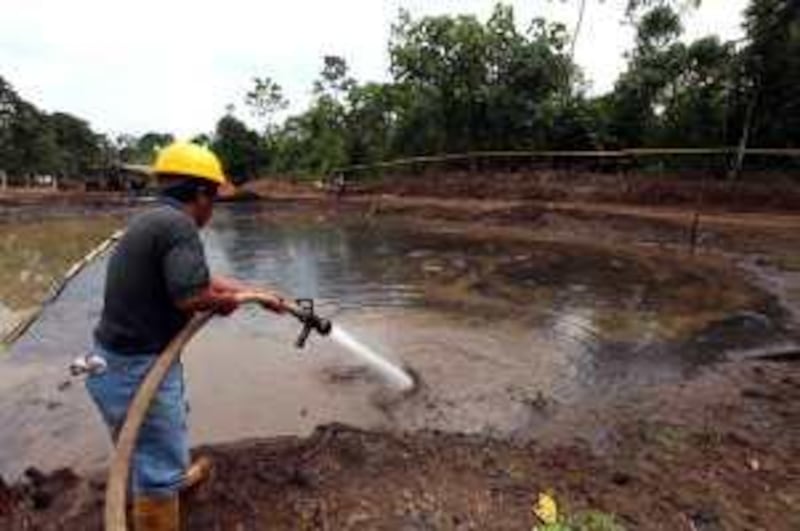The patch of Amazon rainforest overlying Ecuador's ITT oil block may contain the richest concentration of flora and fauna on the planet, and the OPEC country's government wants the rest of the world to pay it to keep some 850 million barrels of crude in the ground there. After a rocky start, the 2007 Yasuni-ITT proposal to raise up to US$3 billion (Dh11.01bn) of international donations gained traction in Europe ahead of last December's climate change summit in Copenhagen. Last month, however, the negotiations were halted amid allegations that the Ecuadorean president Rafael Correa was trying to derail an impending deal. Last Sunday, the country's vice president, Lenin Moreno, said he would travel to the Near and Middle East in a further attempt to raise funds for the plan.
"We will be in Iran, Dubai and Turkey to ask for support for the initiative," he said during a televised address. "We are going to go forward with this project." Given the precarious financial state of all three of the new proposed donor governments, however, Mr Moreno's announcement raises as many questions as his boss's previous actions. Last month, according to the Ecuadorean environmental advocate Paul Paz y Mino, Mr Correa undermined his own negotiating team by denouncing prospective foreign donors from Europe and threatening to drill the oil block if they failed to drop demands for oversight of their financial contributions. The president also publicly reprimanded his government's negotiating team, led by the then minister of foreign affairs, Fander Falconi, for accepting "shameful" conditions for a deal for an international trust fund to be administered by the UN Development Programme.
"Let the northern countries keep their money," Mr Correa said on January 9 in his weekly radio address. "If they don't accept our conditions, they can keep their money and we'll drill." The affair led to the last-minute scuttling of the trust agreement, which would have paved the way for nearly $1.5bn of financial contributions from Spain, Germany, Belgium, France and Sweden, and to Mr Falconi's resignation from the government. "Evidently there are oil interests wanting to drill," he said at a press conference following his resignation. Ecuador claims that by not producing the heavy oil deposit beneath the north-east corner of its Yasuni National Park, it would forgo about $6bn in revenue while preventing 410 million tonnes of carbon dioxide from being released into the atmosphere. The emissions would result both from oil extraction activities and from deforestation.
Ecuador, which this year holds the OPEC presidency, depends on oil revenues for about a third of its national budget. Three oilfields within Yasuni park, including the ITT field, account for 20 per cent of the country's crude reserves. Last month, Mr Correa had set a June deadline for reaching an agreement for the Yasuni-ITT initiative. Yasuni park, a UNESCO world biosphere reserve, contains more species of amphibians, birds, mammals and flowering and spore-bearing plants than any other area in South America, according to a recent study US led study.
@Email:tcarlisle@thenational.ae





